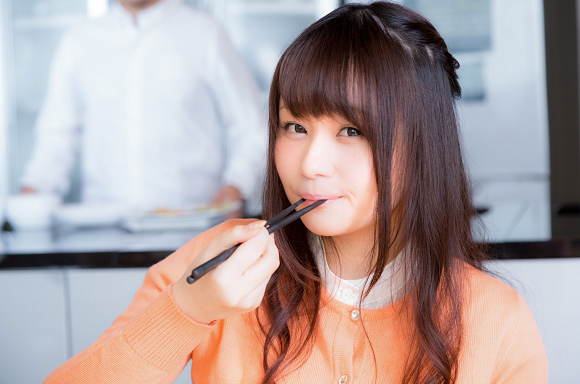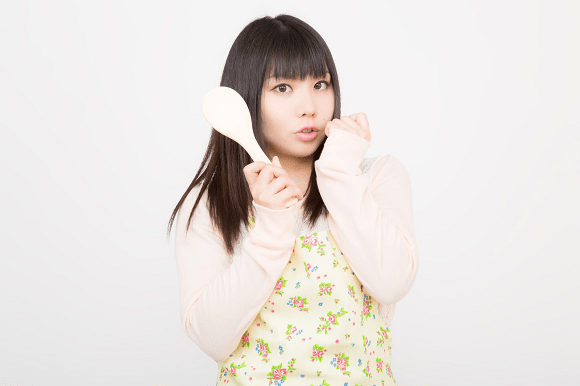
Survey respondents see subtle signs of potential for a happy home life in female coworkers’ desks, lunches.
With more Japanese women working than ever before, men are increasingly pitching in with chores around the house. However, it’s still largely the norm that once a couple gets married and has kids, the wife will take on the majority of domestic duties, with many leaving the workforce at least temporarily to be full-time moms.
When coupled with the fact that many marriages in Japan blossom out of office romances, it’s perhaps not so surprising that young men are often looking for clues as to whether or not their female coworkers seem like the domestic type or not. In a recent poll by Japan’s I Research, 200 working men between the ages of 20 and 39 were asked for the three things that tip them off that a woman would be good at running a family household, with three points awarded to their number-one trait, two to their second, and one to their third.
When the points were tallied, the top 10 were:
10. She has neat handwriting. (32 points)
9. She doesn’t like/only has a few brand-name fashion accessories. (35 points)
8. At drinking parties, when the waiter serves a platter of food family-style, she dishes up a portion for everyone. (40 points)
7. She doesn’t wear revealing or flashy clothing. (41 points)
6. She has good table manners and eats neatly. (54 points)
5. Her makeup isn’t heavy. (78 points)
4. She speaks politely. (93 points)
3. She brings a water bottle to work with her. (101 points)
2. She keeps her desk neat and tidy. (103 points)
1. She cooks her own lunch and brings it to work in a bento box. (296 points)
Overall, the results show a strong mental connection between modesty and domesticity. While some of that can be attributed to a traditional taste in docile-mannered women among older-fashioned Japanese men, it could simply reflect a belief that not needing to always put your own desires first goes a long way towards getting along with the people you share a home with. Likewise, should kids enter the picture, having a partner who values manners and etiquette will definitely make it easier to instill a similar sensibility in your children.
Monetary matters also show up several times in the list, with respondents saying a thrifty woman who eschews designer fashion and store-bought food and drink for less expensive items gels with their image of being domestic. Once again, there are probably two sides at play here. On the one hand, as we talked about above, even today it’s not unusual for women in Japan to stop working after having children, and for men who face the prospect of becoming the family’s sole breadwinner, having a wife with reasonably priced tastes reduces the required amount of bread they have to win.
But on the other hand, even when the husband is the only one in the family with a paying job, in Japan it’s oftentimes the wife who’s in charge of managing the family’s finances, including setting and dolling out her husband’s spending money allowance, taken out of the paycheck that he hands over to her to divide up between necessary expenses and savings deposits. So a woman who shows an aptitude for trimming unnecessary expenditures means that those breadwinner husbands can count on the family’s CFO taking good care of their bottom line.
Source: Livedoor News via Jin
Top image: Pakutaso
Insert images: Pakutaso (1, 2, 3)




 Fear of failure could be behind the extremely low happiness rate among Japanese men
Fear of failure could be behind the extremely low happiness rate among Japanese men English pick-up lines: Foreign writer shares his advice with amorous Japanese men
English pick-up lines: Foreign writer shares his advice with amorous Japanese men Japanese husbands in survey say they do half the housework and childcare, wives say “Nope!”
Japanese husbands in survey say they do half the housework and childcare, wives say “Nope!” 10 ways in which Japanese men want to outperform their girlfriends【Survey】
10 ways in which Japanese men want to outperform their girlfriends【Survey】 Nearly half of young Japanese women say they “hate” the company they work for in survey
Nearly half of young Japanese women say they “hate” the company they work for in survey How to order snacks on a Shinkansen bullet train in Japan
How to order snacks on a Shinkansen bullet train in Japan Demon Slayer: Kimetsu no Yaiba gets new roller coaster attractions and food at Universal Studios Japan
Demon Slayer: Kimetsu no Yaiba gets new roller coaster attractions and food at Universal Studios Japan Hello, cosmetics! Clinique teams up with Hello Kitty this summer for first-time collaboration
Hello, cosmetics! Clinique teams up with Hello Kitty this summer for first-time collaboration Japan’s new difficult-to-drink-from beer glass protects your liver, but it’s a brutal experience
Japan’s new difficult-to-drink-from beer glass protects your liver, but it’s a brutal experience Nintendo history you can feel – Super NES, N64, and GameCube controllers become capsule toys
Nintendo history you can feel – Super NES, N64, and GameCube controllers become capsule toys Burger King Japan suddenly adds Dr. Pepper and Dr. Pepper floats to its menu nationwide
Burger King Japan suddenly adds Dr. Pepper and Dr. Pepper floats to its menu nationwide Princesses, fruits, and blacksmiths: Study reveals the 30 most unusual family names in Japan
Princesses, fruits, and blacksmiths: Study reveals the 30 most unusual family names in Japan New Nintendo Lego kit is a beautiful piece of moving pixel art of Mario and Yoshi【Photos】
New Nintendo Lego kit is a beautiful piece of moving pixel art of Mario and Yoshi【Photos】 Japan’s foreign population reaches historic milestone following largest-ever single-year surge
Japan’s foreign population reaches historic milestone following largest-ever single-year surge We check out the local flavors of the commonly confused Ome and Aomi areas of Tokyo in one day
We check out the local flavors of the commonly confused Ome and Aomi areas of Tokyo in one day “The most Delicious Cup Noodle in history” – Japan’s French Cup Noodle wins our heart【Taste test】
“The most Delicious Cup Noodle in history” – Japan’s French Cup Noodle wins our heart【Taste test】 Starbucks releases a cute Frappuccino and Unicorn Cake…but not in Japan
Starbucks releases a cute Frappuccino and Unicorn Cake…but not in Japan Kyoto Tower mascot termination reveals dark side behind cute Japanese characters
Kyoto Tower mascot termination reveals dark side behind cute Japanese characters McDonald’s Japan’s Soft Twist Tower: A phantom ice cream only sold at select branches
McDonald’s Japan’s Soft Twist Tower: A phantom ice cream only sold at select branches Yabai Ramen: What makes this Japanese ramen so dangerous?
Yabai Ramen: What makes this Japanese ramen so dangerous? Finally! Nintendo Japan expands Switch 8-bit controller sales to everybody, Online member or not
Finally! Nintendo Japan expands Switch 8-bit controller sales to everybody, Online member or not Japanese government wants to build luxury resorts in all national parks for foreign tourists
Japanese government wants to build luxury resorts in all national parks for foreign tourists To combat declining birth rate, Japan to begin offering “Breeding Visas” to foreigners
To combat declining birth rate, Japan to begin offering “Breeding Visas” to foreigners 10 things you should buy at 7-Eleven in Japan
10 things you should buy at 7-Eleven in Japan Studio Ghibli releases anime heroine cosplay dresses that are super comfy to wear
Studio Ghibli releases anime heroine cosplay dresses that are super comfy to wear Woman charged for driving suitcase without a license in Osaka
Woman charged for driving suitcase without a license in Osaka Studio Ghibli unveils My Neighbour Totoro miniature house model
Studio Ghibli unveils My Neighbour Totoro miniature house model Kyoto experiencing problems with foreign tourists not paying for bus fares, but not on purpose
Kyoto experiencing problems with foreign tourists not paying for bus fares, but not on purpose Fighting mild hunger with a Japanese soda that turns into jelly in the stomach【Taste test】
Fighting mild hunger with a Japanese soda that turns into jelly in the stomach【Taste test】 Studio Ghibli’s Howl’s Moving Castle tapestry unveiled in Japan for first time
Studio Ghibli’s Howl’s Moving Castle tapestry unveiled in Japan for first time McDonald’s new Happy Meals offer up cute and practical Sanrio lifestyle goods
McDonald’s new Happy Meals offer up cute and practical Sanrio lifestyle goods Sales of Japan’s most convenient train ticket/shopping payment cards suspended indefinitely
Sales of Japan’s most convenient train ticket/shopping payment cards suspended indefinitely Sold-out Studio Ghibli desktop humidifiers are back so Totoro can help you through the dry season
Sold-out Studio Ghibli desktop humidifiers are back so Totoro can help you through the dry season Japanese government to make first change to romanization spelling rules since the 1950s
Japanese government to make first change to romanization spelling rules since the 1950s Foreigner’s request for help in Tokyo makes us sad for the state of society
Foreigner’s request for help in Tokyo makes us sad for the state of society Ghibli founders Toshio Suzuki and Hayao Miyazaki contribute to Japanese whisky Totoro label design
Ghibli founders Toshio Suzuki and Hayao Miyazaki contribute to Japanese whisky Totoro label design Doraemon found buried at sea as scene from 1993 anime becomes real life【Photos】
Doraemon found buried at sea as scene from 1993 anime becomes real life【Photos】 Tokyo’s most famous Starbucks is closed
Tokyo’s most famous Starbucks is closed Japanese men rank the top 10 complaints they hope to never hear from their wives
Japanese men rank the top 10 complaints they hope to never hear from their wives Names of 10 Kyoto Animation arson victims released, family and friends offer words of remembrance
Names of 10 Kyoto Animation arson victims released, family and friends offer words of remembrance Japanese women show continuing decline in how much they expect a husband to earn in survey
Japanese women show continuing decline in how much they expect a husband to earn in survey Poll asks for the top 10 times Japanese men are disappointed in their adult daughters
Poll asks for the top 10 times Japanese men are disappointed in their adult daughters Judge sets new line for adultery in landmark case, and it doesn’t involve intercourse
Judge sets new line for adultery in landmark case, and it doesn’t involve intercourse 30 random things Japanese girls say that annoy Japanese men
30 random things Japanese girls say that annoy Japanese men The top 10 traits of the “perfect wife” according to the ladies of one Chinese city
The top 10 traits of the “perfect wife” according to the ladies of one Chinese city Only one demographic in survey is happy about Japan’s workplace obligation Valentine’s chocolate
Only one demographic in survey is happy about Japan’s workplace obligation Valentine’s chocolate 10 misconceptions Japanese people think foreigners have about Japan
10 misconceptions Japanese people think foreigners have about Japan Is the ideal spouse someone who’s your best friend or your war buddy? Japanese singles sound off
Is the ideal spouse someone who’s your best friend or your war buddy? Japanese singles sound off Survey shows how Japanese couples feel about spending so much time together sheltering in place
Survey shows how Japanese couples feel about spending so much time together sheltering in place 6 surprising things about having a baby in Japan
6 surprising things about having a baby in Japan The proper response when your wife says “I can’t make dinner tonight?” Japanese Twitter debates
The proper response when your wife says “I can’t make dinner tonight?” Japanese Twitter debates The odd phenomenon of some Japanese husbands making their wives put their socks on for them
The odd phenomenon of some Japanese husbands making their wives put their socks on for them Survey shows Japanese women would love to be getting some chocolate on Valentine’s Day too
Survey shows Japanese women would love to be getting some chocolate on Valentine’s Day too Barely half of Japanese men in survey will give thank-you gift to women for Valentine’s chocolate
Barely half of Japanese men in survey will give thank-you gift to women for Valentine’s chocolate Is it OK to split the bill on a date in Japan? Survey asks what women and men of different ages think
Is it OK to split the bill on a date in Japan? Survey asks what women and men of different ages think
Leave a Reply